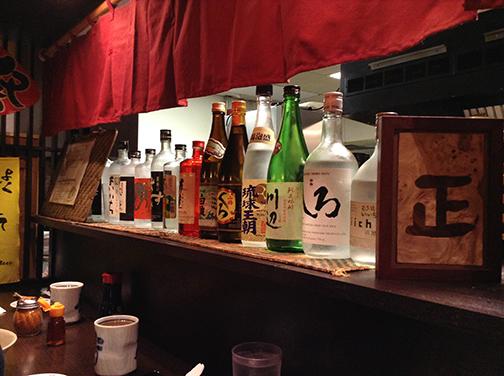It’s been four years since I left Japan, and I haven’t been able to find a restaurant that perfectly encapsulates the perfect feeling of “home” that I’ve been searching for here in the U.S.
However, there’s something about the nostalgic, sepia-toned ambiance of Izayakaya Masa, located in Mission Hills, that perfectly resembles the street markets of Tokyo I used to wander as I was growing up.
With the “master” of the restaurant working his way through bowls of ramen and Japanese dishes behind the bar, while yelling Japanese orders to his servers, there was a moment where I felt like I was back in Japan again.
Izakaya is the literally the translation of “bar” in Japanese. However, the idea of Izakaya is far from the Western definition of what a bar looks like in Japan. Izakaya is not simply a place where alcoholic beverages are served; Izakaya is a place where food becomes a main player in connecting people through eating, and most importantly, in conversation. People are expected to sit down in small rooms or booths of tatami mats, take off their shoes, and sit with their fellow workers to eat, converse and celebrate hard work.
Izakaya Masa follows this central Japanese philosophy about food. Yes, the food is important. But, you know what’s even more important? The people.
Featuring a range of food from classic Japanese Izakaya dishes, such as karaage, Japanese fried chicken, and takoyaki, Japanese octopus balls originating from Eastern Japan, Izakaya Masa covers all the essentials.
However, what becomes the main attraction of Izakaya is not the bar food, but it’s ramen. Ramen, in many ways, is a classic Japanese soul food. It’s the hamburger of Japanese society, designed to not only warm you up internally, but also spiritually.
I had Hakata ramen. Unlike the common “Tokyo-style” soy sauce based broth that most people are used to, Hakata ramen is a style of ramen originating from the Hakata district of Southern Japan. The Hakata ramen is made from a pork-based soup, otherwise known as tonkotsu with toppings typical of Southern Japan, such as pickled ginger and straight styled noodles, and toppings expected of all ramen dishes, marinated pork belly and boiled egg. Hakata-style ramen is known throughout Japan as being hearty, heavy and ultimately very creamy. Which is probably why it didn’t suit me as well as it did my neighbors.
Izakaya offers ramen in other styles as well: Shio, a salt-based broth, a hybrid tonkotsu and shio-based broth. If you have to get a ramen dish at Izakaya, I highly suggest getting the Hakata ramen. It’s not only authentic to the region, but it serves a bowl of ramen that satiates, a broth that warms you up from within and a pork belly slice that practically melts in your mouth. It’s that good. But surprisingly, the ramen and appetizers aren’t what’s at the heart of Izakaya.
The very spirit of a Japanese bar is within the space. It’s about sitting down on a tatami mat, ordering drinks, food and settling in an area and call it your home. Businessmen in Japan usually go to izakayas after the week, late at night, to be merry and eat, releasing a bit of tension after a long work week with their comrades.
It’s not about the alcohol, or even the food, it’s about the conversation.
Roger Ebert, famed film critic of the Chicago Sun Times, fell to a disease that left him unable to eat. When asked what he missed most about eating, he didn’t miss so much the food itself, but the conversation that surrounded the act of eating around the dinner table.
“The loss of dining, not the loss of food,” Ebert said. “It may be personal, but for, unless I’m alone, it doesn’t involve dinner if it doesn’t involve talking. The food and drink I can do without easily. The jokes, gossip, laughs, arguments and shared memories I miss.”
I didn’t realize this, but as I was eating my ramen and takoyaki, I was caught up in a sweeping conversation about our friends, school and our futures. We didn’t notice the time tick by. I didn’t realize it, but amidst the ramen, takoyaki and dimply lit lanterns, I almost forgot I was in the U.S. It almost felt like home.









